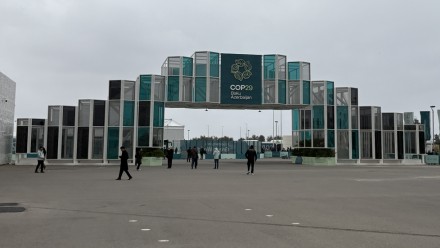ANU at COP29
The UN climate conference COP29 concluded with a deal on climate finance, an agreement on a framework for carbon markets nearly a decade in the making, continued contestation of many issues including the global transition away from fossil fuels, and the shadow cast by the US election, geopolitical tensions and cost-of-living concerns.
The annual climate conference is not only the venue for government negotiations. It is also, and in some ways not even primarily, a giant trade fair for everything to do with climate action. ANU is among the select group of universities globally that have a presence at COP. At COP29, ANU hosted several side events, ANU academics spoke at side events by other organisations, ANU Academic Sala Dr Georg Carter sat on the COP29 Presidency Scientific Council , ANU alumni participated via the Climate Scholars program, and ANU students took part under an initiative by the Global Alliance of Universities on Climate Change which ANU is a member of.
One area of focus for ANU outreach was “trade and climate”, which is fast rising in international climate policy. The overarching theme is how to square trade policy with climate change goals, and how to design and implement trade-related climate policy so to be compatible with rules-based and efficient trade.
ANU co-hosted an official UNFCCC side event (with US think tanks Resources for the Future and Center for American Progress, and India’s Shakti Foundation) on trade, climate and development, headlined by US Senator Sheldon Whitehouse. ANU also hosted an event on climate and trade featuring speakers from ANU, MIT, the AIGroup and the Australian government, covering among other things Australia’s Carbon Leakage Review.

Professor Howard Bamsey moderating the panel on Climate and Trade - Expanding the policy repertoire.
Another key topic for ANU at COP29 was Australia’s opportunities to become a large producer and exporter of renewables-based energy-intensive commodities, and thereby to help the world decarbonize. This vision, mapped out for example in research under the ANU Zero-Carbon Energy for Asia-Pacific initiative, is now well understood in Australia but still largely new to a global audience.
ANU co-hosted (with Clean Energy Council) an event on decarbonizing heavy industries featuring speakers from ANU, Tsinghua University, UNSW and Rio Tinto, opened by Assistant Minister Josh Wilson. ANU also contributed to an event on green mining by the Australian Sustainable Finance Institute, and another by the Energy Efficiency Council that drew out the need for greater R&D efforts.

Associate Professor Fiona Beck speaking at From red rock to green metal: Decarbonising the world’s largest iron-ore-to-steel supply chain.
ANU staff have also had opportunities to provide analysis on COP29 in mainstream media, such as this interview on ABC radio, and this piece by Professor Howard Bamsey.
Some of the ANU delegation at COP29: Frank Jotzo, Zoe Kaser (GAUC), Annette Zou, Fiona Beck & Howard Bamsey.











